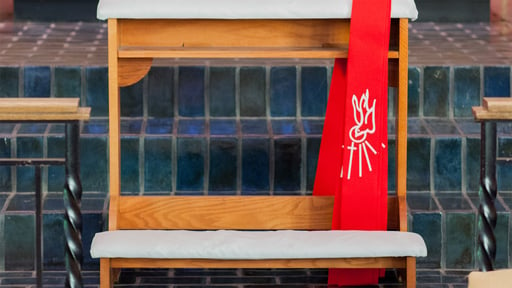We know God has a great sense of humor, and I appreciate the Bible stories that make us laugh about how God works. The disciples on the road to Emmaus, in Luke 24, is one of those stories. After the resurrection on Easter morning, Jesus sneaks up on two disciples on their way to Emmaus. "What are you guys talking about?" Jesus asks, nosing his way into their conversation. They don't recognize him and proceed to tell Jesus all about himself. Then Jesus calls them silly fools. Every time I read that story, I can't help but laugh at God's humor and how oblivious I, and all people, can be.
The way to Emmaus is the shocking, delightful, and unpredictable encounter of the risen Lord Jesus in our lives. This New Testament demonstration, comparable to "The Angel of the Lord" appearing to people in the Old Testament (like Hagar, Gideon, and Samson's parents), this passage gives us hope that we too might meet God face to face in our lives.
But I was struck while reading Luke 24 recently. This interaction wouldn't even have occurred in the modern world. We have destroyed the Road to Emmaus: the dramatic approach of God himself, the conversation, the invitation to a meal. It seems like such a story would not even be able to be written in our era. I have identified four ways we've done damage to God's pathways of communication, and some ways forward for us today.
1. We hardly walk anywhere anymore.
We shop online, drive everywhere we need, and have to wear Fitbits to make sure we get enough steps in. The men in Luke 24 walked seven miles, and then they turned around after recognizing Jesus and ran back. Another seven miles.
A new way to Emmaus: We are physical beings, and God created us to use our bodies. Jesus himself is "enfleshed" and cares about our physical world. God wants us to work and push our bodies. If you are going somewhere less than a mile away, consider walking instead of driving. The modern world encourages shortcuts; we have enough time to put in some physical effort. We can all cut out some social media, technology, or entertainment time and put it toward using our physical bodies in physical space. Speaking of social media . . .
2. We often utilize mobile time as "mobile" time.
What is the percentage of people who text, talk, take pictures, or play games on their mobile device while walking or travelling? Extremely high. They have had to put beepers at crosswalks to get people's attention, and some children have even been injured walking into the street while texting.
A new way to Emmaus: We should walk with eyes up and open; how else will we encounter God in our world? We meet the world with all our senses, and we do not need our experiences to be mediated by a mobile device. What's at risk is a heightened sense of "being connected", while actually having a real loneliness that isolates us further. When traveling, either with your own two feet, in a vehicle, or public transportation, fight the urge to "do work" or entertain yourself. The world is not boring; let's meet God's world ready to meet God himself, or at least a new friend. Which brings us to number three.
3. We rarely talk to strangers.
There is very little trust in our modern world. While we might follow someone we've never met on social media, engaging a complete stranger seems to be almost pointless or overwhelming. We don't know who is friend or foe, and we freeze or just avoid any opportunity with risk involved. A culture of disengagement only adds more distrust into the system. If Jesus walked up to us today, a complete stranger, and asked us what we were talking about, I wonder how we would respond.
A new way to Emmaus: "Stranger danger" is built into us as babies, and a healthy level of mistrust is appropriate. But we as Christians, walking through this world, should see each person as a broken individual in need of Christ's redemption. We know that everyone has a dark side, and everyone is worthy of redemption. This gives us a wonderful platform with which to engage strangers (as well as friends and family). We should be open to an opportunity to let a chance conversation turn into a chance to share Jesus' love, whether through word or deed. And we might even find that we are the ones blessed through the experience, like the Emmaus Road disciples.
4. We rarely share meals with others.
Today we are just as apt to eat dinner in our car as we are around a table with our families. Our busy schedules do not lend themselves to planned meals and dirty dishes. The disciples inviting the stranger Jesus into their home for a meal? We are all completely out of our comfort zone, even hearing that.
A new way to Emmaus: We know that God shows up during meals; this is the heart of Communion. That means that every time we eat with another, it is an opportunity for God's presence in our lives and relationships. With as many restaurants and coffee shops as we have, it makes it easy to have a "neutral" ground to share a meal. But we should stretch ourselves, opening up our homes, cooking meals, and sharing tables with others. In the breaking of the bread, our lives may become enriched in ways we never knew.
Don't underestimate Jesus' plan and sense of humor; today might be your turn to "entertain an angel unawares."
Study more about the Book of Luke with these free study questions.





.jpg?width=50&height=50&name=IMG_20220621_160541_456%20(1).jpg)







